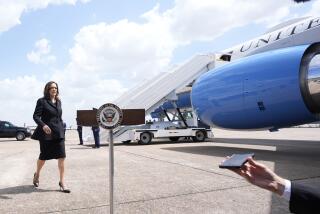Brown keeps it formal with Bush
President Bush and Britain’s new prime minister, Gordon Brown, emphasized Monday that their nations are united by shared values and a deep commitment to defeat global terrorism.
But Brown also telegraphed his differences with the U.S. president over the issue, choosing to define the struggle as a fight against crime, instead of a war on terror, and calling Afghanistan, not Iraq, the front line.
The overnight visit to Bush’s Camp David retreat was Brown’s first trip to the United States since he took over last month from Tony Blair, who had an unusually close friendship with Bush and was an unwavering supporter of the Iraq war. It was also the first measure of the more arm’s-length relationship Brown intends to establish with Washington.
Brown used the short news conference to signal that, though the United States and Britain are the diplomatic version of best friends, there are subtle differences in perspective, if not policy.
In his opening comments, Brown avoided using the term “war on terror” and asserted that “terrorism is not a cause, it is a crime.” He also described Afghanistan as the “front line against terrorism.” Bush usually describes the war in Iraq that way.
Brown made clear that the U.S. and Britain have a strong alliance and common values, but he stopped short of a personal endorsement of Bush’s approach to terrorism. British commentators were quick to point out that Brown did not return Bush’s effusive compliments. And Brown’s request that both leaders wear suits sent a signal that the meeting was business, not pleasure.
Bush, however, gave no sign that the two leaders were anything but in sync. “So everybody’s wondering whether or not the prime minister and I were able to find common ground, to get along, to have a meaningful discussion, and the answer is: absolutely,” Bush told reporters.
‘A glass-half-full man’
The president went out of his way to praise Brown’s character, saying he is not the “dour Scotsman” of press accounts. “He’s a glass-half-full man, not a glass-half-empty guy, you know?” Bush said.
The British prime minister, wary of the political damage Blair suffered over his closeness to the Bush administration, has given little indication that he’d like to replicate that relationship with Bush.
Instead, through his initial appointments and policy statements, Brown has hinted at a forthcoming drawdown of British troops in Iraq and a foreign policy grounded not only in London’s relations with the United States, but in its position as a member of the European Union.
“Brown has established the kind of ambiguity in the relationship that did not exist between Tony Blair and George W. Bush,” commentator Ewen MacAskill wrote in the Guardian. While the two leaders, he added, may be “no longer joined at the hip ... they are still within touching distance.”
Fine line
Bush was clearly aware that Brown was walking a fine line, and made a point of saying that Britain is as important to the United States as the other way around. “I would say that the relationship between Great Britain and America is our most important bilateral relationship,” he said.
Still, the different language the two leaders employed on Iraq and Afghanistan stood out. When he was questioned about it, Brown appeared to smooth over the difference by saying that Afghanistan was “the first line in the battle against the Taliban.”
Brown’s official spokesman, who is not quoted by name according to British convention, said the prime minister meant both that Afghanistan is the “front line” and the “first line.”
“What he meant was that Afghanistan was the front line and remains the front line where we are taking on the Taliban and Al Qaeda,” said the spokesman.
In his 2004 reelection campaign, Bush repeatedly chastised his opponent, Sen. John F. Kerry (D-Mass.), for saying he hoped fighting terrorism would eventually become primarily a law enforcement issue.
However, Bush conceded Monday that law enforcement is a part of fighting terrorism. “Look, we’re dealing with a variety of methodologies,” he said. “One is intelligence, one is law enforcement, and one is military.”
Iraq withdrawal
Britain has been slowly withdrawing its forces from Iraq, citing increased stability around its center of operations in the southern city of Basra. Britain now has about 5,000 troops in Iraq, compared with the 40,000 deployed earlier in the operation. With Bush’s troop buildup, there are now about 160,000 U.S. troops in the country.
Bush insisted that despite Brown’s signals that he favors withdrawal, the two see eye to eye on the conflict. “There’s no doubt in my mind that Gordon Brown understands that failure in Iraq would be a disaster for the security of our own countries,” he said.
For the most part, Brown used careful language to describe the conflicts, pointing out, for instance, that the war in Iraq was being fought against a number of elements, including native insurgents, Iranian influence and some foreign Al Qaeda fighters.
Bush’s language was simpler.
“Look, people who kill innocent men, women and children to achieve political objectives are evil. That’s what I think. I don’t think there’s any need to negotiate with them,” Bush said.
Bush’s relations with Brown seemed considerably warmer than those with the British press, especially with a BBC reporter who had asked the president previously whether he was “in denial” about Iraq.
“You better cover up your bald head. It’s getting hot out,” Bush teased the reporter, Nick Robinson, as he turned to leave.
“I never knew you cared, sir,” Robinson replied, leaning down to pack his bags.
Bush appeared to be out of earshot, but he turned around and replied jocularly but clearly, “I don’t.”
kim.murphy@latimes.com
Reynolds reported from Camp David, Md., and Murphy from London.
More to Read
Get the L.A. Times Politics newsletter
Deeply reported insights into legislation, politics and policy from Sacramento, Washington and beyond. In your inbox three times per week.
You may occasionally receive promotional content from the Los Angeles Times.








